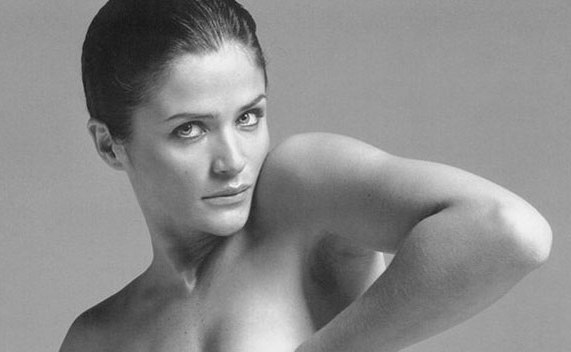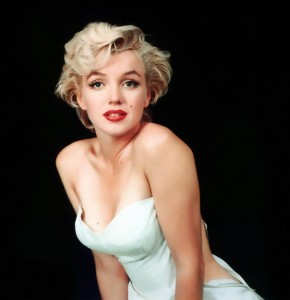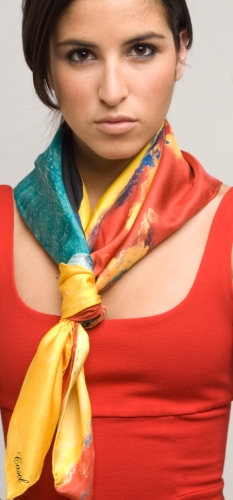
Traveling is always an mind-expanding experience. People who have never traveled to places with cultures dramatically different from their own sometimes have very little grasp of how much ideals of beauty vary around the world. For example, in Uruguay, where I was born, and all over Latin America for that matter, half the girls with dark hair bleach it to become the image of the typical dumb blonde. On the other hand, when I spent some time in Finland while shooting my film, I saw something I had never seen; namely, platinum blonde girls who dye their hair black, and who are horrified at the prospect of dating a blonde boy.
So, what drove me to elaborate on ideals of beauty, dumb blondes, supermodels, and what not? Maybe it was the two Pamuk novels I just read back to back, where men yearn for beautiful women, for no other reason than their looks, and die in their failed attempts to possess them;
maybe it was the tiny woman with huge silicon implants, balancing in endless spike heels, trying to secure the latest designer fashions at the mall last night; whichever the case, I just had to write about this and try to make sense of our ideas of beauty and the myths about beautiful women in particular.

If Pamuk´s novel SNOW had been written as a cosmetic surgery ad, the main character´s description of his love interest Ipek might have read something like this, “Her silicon implants were enormous, her pouting collagen lips were inviting, and her eyeliner tatoos gave her gaze incredible depth.” Minus the references to cosmetic surgery, this is about right for the poet Ka´s description of Ipek. The man, an educated Istanbulian now living in Germany; furthermore, a poet; falls in love with nothing more than the woman´s looks. When he meets Ipek´s beautiful sister Kadlife, he wonders extensively as to “which one is the most beautiful of the two,” and it seems that he would be ready to exchange one for the other, should he conclude that Kadlife´s beauty is superior. Such is the shallowness of Pamuk´s inspired poet.
In THE MUSEUM OF INNOCENCE, which I read before SNOW; though SNOW is a much earlier work; the protagonist is engaged to a beautiful, cultured woman who is there for him whenever he needs her, but, alas, he falls madly in love with a shop assistant, whose only remarkable trait is, of course, that she once participated in a beauty pageant and, of course, she is one of the most beautiful women anyone has ever seen in Istanbul. The man betrays and disappoints both women to end his life putting together a museum of all the objects the beautiful Fusun ever lay her hands on. In a way, the novel can read as a tribute to the obsession with beautiful women and female beauty in itself.

In both novels, one of the things that fill the lead male characters´ hearts with the most joy is to know that people perceive them as the possessors of such beautiful women. They are always “smiling inside,” when they realize somebody thinks that they are married or in a couple with these beautiful women; even if it is random strangers on the street or at a cafe. If this is not proof that what Ka in SNOW and Kemal in THE MUSEUM OF INNOCENCE are looking for is nothing other than a trophy wife, I don´t know what is.
Honestly, I do not look up to novelists for moral guidance, but the shallowness of this approach greatly disappointed me, and it got me thinking about why men are so desperate to land those trophy wives or girlfriends, what it means to be a beautiful woman around the world today, and why we are all letting ourselves be caught up in that frenzy of the search for perfection, myself included.
In a way, I was disappointed because if serious writers like Pamuk are putting forward these shallow ideas about love and these superficial ideas about women, then what can we expect from popular media? I believe that as a narrator, Pamuk should have been at least slightly critical of these superficial infatuations, let alone trying to make the women more real…
Of course, Pamuk is not the only one, and we mustn´t forget that he comes from a country where women are still far from being considered equal to men, to say the least. We can all relate to what Pamuk is writing because we have seen this a million times. Even when Shakespeare wrote that beautiful sonnet about admiring things about a woman which are not considered traits of beauty by most people some hundreds of years ago; thousands of years of evolution have not been enough to eradicate the most simplistic views on female beauty that still seem to rule the world today.
Personally, I think that most women would rather hear someone praising them for their “failings,” like Shakespeare brilliantly did, than for their green eyes in Latin America or olive skin in Scandinavia. Beauty is, in fact, also a market of offer and demand. Everybody wants what is rare. In countries where everyone is blonde, whether they are smart or dumb, blondes are down; where dark eyes are common, green and blue eyes are preferred, and so forth.
What I mean to say, in a way, is that beauty doesn´t really exist as an absolute. Essentially, if we look at the ideals of beauty portrayed in the media, the girls who have undergone dozens of cosmetic surgery procedures and their enhanced photographs, beauty equals fake. The women in those magazines are not real. They are made of plastic, their cellulite is airbrushed off, and they do a million things they don´t enjoy to stay the way they are.
One thing I liked about the 90s was the fact that supermodels were more real back then. Girls like Helena Christensen or Yasmeen Ghauri became famous because they had personality and they were amazing in front of the camera; and if you looked at their pictures when they were little girls, you could actually recognize them, because cosmetic surgery had not deformed them. But times have changed. I am not saying that the 90s were perfect. It was still pretty tough to compete with the voluptuous bodies and bewitching eyes of those supermodels, but at least their bodies were not out of a malnutrition photography exhibition.
As a woman, I have fantasized many times about what life would be like looking like one of those supermodels. Honestly, I rather appreciate the anonymity granted by looking more ordinary. While we all aspire to beauty, I have to say that, because men are largely like Pamuk´s heroes, women who are considered to be extremely beautiful have a hard time in many aspects of life. First of all, anyone will confess true love to them, while all they want is to fulfil their fantasies of having their friends envy their beautiful trophy wife one day.
I have seen the most spiritual men ask women to marry them at first sight, and meaning it. I have often puzzled about this disconnection between spirituality and shallow ideas about female beauty, and I wonder whether the idea of a more meaningful beauty will ever become the norm.
In this respect, women are much the wiser, We have been aware of what meaningful beauty means for thousands of years, and male dumb blondes tend to be far less successful with women than female dumb blondes are with men. It seems that even to this day, the social effect of a beautiful woman can be compared to that of a smart man. With so many years of women´s rights struggles behind us, it would seem that even the most intelligent and spiritual among us, such as Pamuk, still see women as some sort of sexual fantasy fit to realize their wild dreams of power, as the envied owners of a much coveted object.




Perhaps Pamuk is not really so spiritual? I can’t say, because I have read none of his works, but in your position I would reconsider what had impressed me about him.
Very well put. Thoughtful analysis, and I think you’re on target.
Thank you, Frederick. I guess it is important to discuss these things, even if it means that we will sometimes incur certain generalizations, in order to make a point.
Thanks for stopping by!
Veronica
I don’t think it is fair for you to make such rash accusation toward “most men” or most anyone because you can hardly claim to know one person well, let alone most of anybody. I think the issue with Orhan Pamuk arises from the fact that sex is also viewed differently in the east than in the west. In the east you don’t separate beauty internal or external. The person is whole. I have to wonder, as western media badgers women for their physical beauty, perhaps it is a level of insecurity and this unfamiliar attitude of Pamuk which may resonate a response due to a level of insecurity? Why go out of one’s way to judge someone’s preference? Is that air of moral superiority going to make the next day better?
I can say I do not have Pamuk’s fixations on certain aspects of a woman but I take what he writes first as the perspective of the character, than his. To be honest I prefer the honesty compared to western media over saturation of “aww it’s only the inside that matters” to comfort “ugly” girls. In saying that I don’t agree with the western concept of beauty.
Having finished My Name is Red literally just an hour or so ago I can say that I found aspects of Black’s love toward Shekure to be disappointing, and others not, just like any other opinion or perspective any other person has toward something. Maybe it isn’t fair, but it’s even less fair for you to generalize about men. Would it be fair to me to generalize about all women after reading some book describing some woman’s perspective about some stout muscular he man type with ripping biceps and arms like tree trunks?
I guess what I am trying to say is playing the victim gains pity once, maybe twice, a third time is annoying.
Well,
you have some very good insights. I wasn’t bothered at all with My name is red. I found the relationship there to be somewhat deeper, plus the novel is a masterpiece.
You are right that relationships are a whole lot different in the East.
Thank you for the very interesting feedback.
Cheers,
Veronica
I am reminded of a story that goes like this. A man walks into a bar and announces that he desires to have intimacy with a woman and he is looking for females who might be interested. A woman walks into a bar and does the same. What are the outcomes of these events? The woman is the decider in both. A man’s shallowness is a byproduct of a woman’s pursuit of influence via beauty. So does her search for beauty not underscore her own shallowness? In other words, both men and women are equal participants in the diminutions of real romance. The differences in physical strength laid the groundwork for how human beings have responded to what they perceive as beauty and what power lies within.
btw…I am really enjoying this website.
Excellent analysis and a very interesting read. Thanks!
wow.. too short! Im hungry for some of your ideas or conclusions that didnt make it into the article.. give the other half of your process?
for sure there is more of the conversation in your head that needs to make it to the page?
i await part 2!
keep writing…
No person is really beautiful if you look closely at their features, it’s just an arrangement of shapes no more special than the shapes that make up anyone else’s face or body. When people believe they are beautiful, they act a certain way that makes others believe they have desirable looks that they want to posses and this gives them power, but it’s really an illusion. Society believes certain characteristics are beautiful and those are the desired features, but If you have a beautiful wife and you see her everyday, she looks normal (and she’s probably a total b*tch). It’s just like being smart for a man. No one is really smarter than anyone else, but some people are more able to convince others that their ideas are more valid. I think it’s all about power and desire and what society believes those things are.
I really enjoyed reading your analysis of Pamuk. To be honest, I haven’t read his work and I was researching on the internet to see where I should start. Regardless, I was glad to find your blog and will come back.